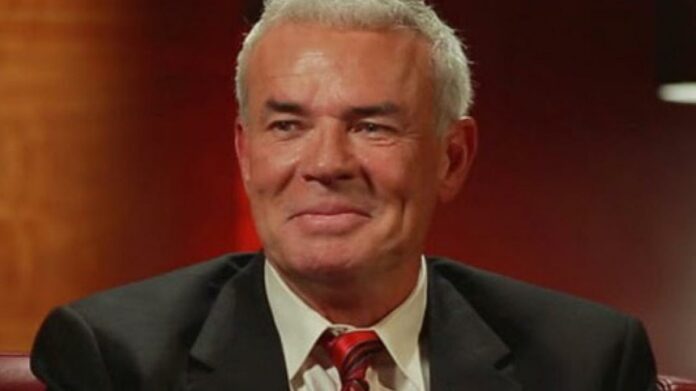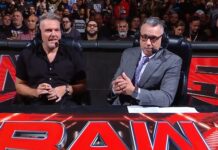
During his recent podcast, Eric Bischoff discussed the launch of AEW. Here are the highlights:
Advice for AEW:
“In a macro kind of way, [my advice would be] be as different as you could possibly be from the competition. It worked for me, that was my self-mandate when I launched Nitro, is ‘Don’t try to be better than the competition; try to be different from the competition.’ And hopefully being different is enough to make people want to check you out. And I would stick with that. Now different in which way, that requires a lot more thought and kind of a granular approach. And you need to know what your strategy [is].”
AEW’s deal with TNT:
“I only know what I read, and I don’t know if what I read is even true or accurate. But for example, if what I read is true, and the AEW/TNT deal is, TNT is gonna cover costs of production. Which to me says that TNT’s gonna actually produce it with their equipment, their crews, their people because that would make sense, and it would also minimize the expense compared to a third-party production company. So I’m assuming TNT is going to actually provide the physical production of the show, and they’re going to split on some basis, some percentage basis. Let’s just say it’s 50/50, they’re gonna split the advertising revenue.”
Wrestling companies struggling to sell ad space:
“Here’s what I do know. This is not something I feel slightly intimidated about saying. Selling advertising in wrestling is extraordinarily difficult. Because wrestling is not a drama, but it is. It’s not a sitcom, but it is. It’s not a sport, but it is. It’s its own weird, kind of f**king duck, right? And it’s really hard to get big advertisers, mainstream advertisers, the one that spend 80% of the revenue in the ad market. It’s really hard to get them comfortable with professional wrestling, simply because they can’t define it. And it makes it hard.”
How ad sales actually work:
“This is the process, okay. Get out your weed-eaters, because we’re gonna get into the f**king weeds. The way advertising is sold, is you have your clients. Your Mars, your General Mills, your Coor’s Beer, your General Motors. Whatever it is, your big advertisers. They hire agencies, and they depend on those agencies to spend the client’s money in the most efficient, effective manner possible to get the biggest ROI [return on investment] that they can on those advertising dollars. And the advertising agency takes a percentage of those dollars that are spent; that’s how they make their money. So if an advertising agency says, ‘Hey, General Motors! We’re gonna spend $4 million over here in this new thing called AEW Wrestling on TNT. They’ve never had wrestling before, not in 25 years, but this new company’s come a long. They haven’t really done television before, but they’ve had some really good PPVs, they have a big buzz, blah blah blah.’ That’s a hard sell. There’s not many advertising agents or executives that want to go to the client and justify that decision. Because they have to, they don’t just get a bucket of money and the client says, ‘Go spend it however you think is best. They have to justify those expenditures. And in many cases, they have to approve them with the client. And because of the fact that wrestling is so unique, it’s a very difficult sell. So here’s what happens … what do salesman normally reach under their bucket of tricks to sell? The hardest thing there is to sell, or the easiest thing there is to sell? The hardest thing to sell is professional wrestling.”
“Now if a client is inclined to spend their money in advertising in wrestling, where do you think they’re gonna be prone to spend it? In a startup on TNT? Or over here in WWE, where they’ve already got a lot of major clients? Somebody else has already crossed that bridge. Somebody else has already proven that it works. Now if you’re a salesman or an advertising executive, who are you gonna try to sell? And that’s what’s gonna make it hard for AEW. It’s not gonna be easy for them to generate money, revenue, in the advertising marketplace and then when they do, they have to split it. So I think that’s gonna be a tough sell.”







